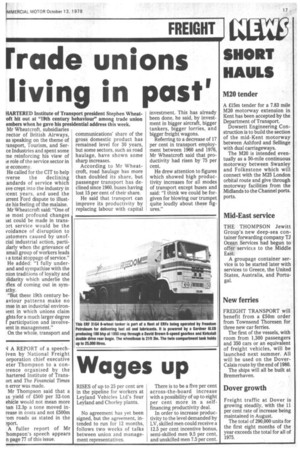rrade unions living in past
Page 19

If you've noticed an error in this article please click here to report it so we can fix it.
HARTERED Institute of Transport president Stephen Wheatoft hit out at "19th century behaviour" among trade union embers when he gave his presidential address this week.
Mr Wheatcroft, subsidiaries rector of British Airways, as speaking on the theme of ransport, Tourism, and Serce Industries and spent some me reinforcing his view of ie role of the service sector in ke economy.
He called for the CIT to help !verse the declining andards of service which we crept into the industry in cent years, and used the wrent Ford dispute to illustkte his feeling of the malaise. Mr Wheatcroft said: "One of )e most profound changes tat could be made in transort service would be the voidance of disruption to ustomers caused by unofcial industrial action, partialarly when the grievance of small group of workers leads ) a total stoppage of service." He added: "I fully under;and and sympathise with the nion traditions of loyalty and %clarity which underlie the flex of coming out in symathy.
"But these 19th century beaviour patterns make no ..nse in an industrial environlent in which unions claim ghts for a much larger degree f participation and involvelent in management."
On the whole, transport and communications' share of the gross domestic product has remained level for 30 years, but some sectors, such as road haulage, have shown some sharp increases.
According to Mr Wheatcroft, road haulage has more than doubled its share, but passenger transport has declined since 1960, buses having lost 15 per cent of their share.
He said that transport can improve its productivity by replacing labour with capital investment. This has already been done, he said, by investment in bigger aircraft, bigger tankers, bigger lorries, and bigger freight wagons.
Referring to a decrease of 17 per cent in transport employment between 1960 and 1976, Mr Wheatcroft said that productivity had risen by 75 per cent.
He drew attention to figures which showed high productivity increases for all modes of transport except buses and said: "I think we could be forgiven for blowing our trumpet quite loudly about these figures."
























































































































































































































